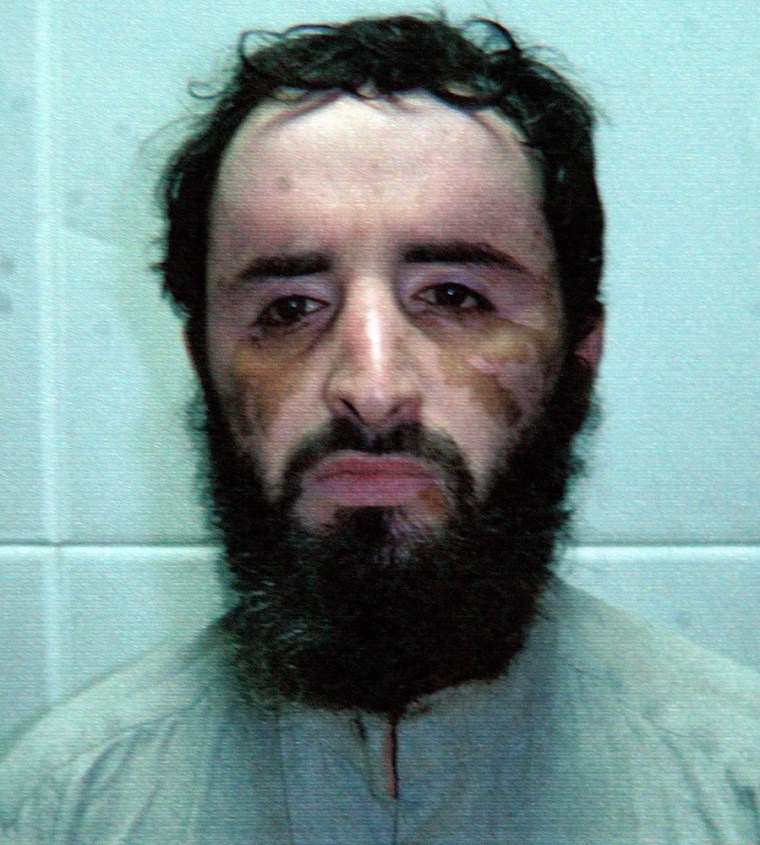The Pakistani military, working with the U.S. military and U.S. intelligence, has captured Abu Farraj al-Libbi, a man both U.S. and Pakistani officials believe is the current operations director of al-Qaida — the successor to 9/11 mastermind Khalid Sheik Mohammed — and the man who they believe is responsible for planning al-Qaida attacks on the United States.
But what else is known about al-Libbi? Here's a primer:
Why he is significant:
• Al-Libbi, a Libyan citizen who has long worked with Osama bin Laden, is believed to have taken over the No. 3 job in al-Qaida with the capture of his mentor Khalid Sheik Mohammed in March of 2003, a senior U.S. official tells NBC News.
• Al-Libbi is in charge of all al-Qaida's U.S. and U.K. operations, including any current plots.
• Al-Libbi knows at least the general whereabouts of bin Laden and Ayman al-Zawahiri, al-Qaida's No. 2.
• He is believed to be the mastermind of the Dec. 14 and 25 assassination attempts against Pakistani President Pervez Musharraf.
• Al-Libbi is believed to have played a role in organizing the 9/11 attacks as Mohammed's top deputy.
• Al-Libbi was previously the director of al-Qaida's North African operations.
Who wants him captured:
Pakistani officials tell NBC News that Musharraf has told confidantes, "We will get him." Pakistani officials released a wanted poster of the country's "most wanted terrorists" offering rewards of 20 million rupees [$340,000] for the capture of al-Libbi and another man, Amjad Hussein. Smaller rewards are listed for four others. Pakistani officials have set a higher reward on al-Libbi and Hussein because of their role in the attempted assassinations. Hussein was later killed by Pakistani forces. All but al-Libbi are Pakistani citizens.
Personal:
Al-Libbi is about 40 years old, slightly built and has a skin condition — possibly psoriasis — that makes him highly recognizable.
Pakistani officials said that al-Libbi is also known as “Dr. Taufeek.”
Operational profile:
U.S. officials have long believed he operates out of the tribal areas of western Pakistan, like bin Laden and Zawahiri, but that he moves more freely than the other two, who Pakistani officials believe are living and traveling separately in the province of South Waziristan, near the Afghanistan border. Pakistani officials believe he is accompanied, as are all top al-Qaida officials, by security and financial advisers.
Capturing him had become a top priority of intelligence agencies in both Pakistan and the United States. Although he has been known to intelligence officials for several years and has been a top target since the capture of Mohammed, capturing him has taken on a new urgency with the discovery of surveillance reports and other intelligence.
The discoveries, on the hard drives of computers of three al-Qaida operatives, have provided the United States and Pakistan with a trove of material regarding al-Qaida plans. Much of what is known about al-Libbi comes from al-Qaida detainees, both those captured in 2003, like Mohammed, and those recently captured.
Al-Libbi is more low-key than Mohammed and slightly older. And unlike Mohammed, he is not familiar with the West, which U.S. officials believe put him at a disadvantage compared with his predecessor and mentor. He is typical of the new group of leaders in the terrorist organization, say U.S. officials, not as capable as their predecessors, but dangerous nonetheless.
"Khalid Sheik Mohammed was a full-service terrorist," said one U.S. official. "He taught al-Qaida operatives how to act in the West. Abu Farraj cannot do that, but he does have the trust of Osama bin Laden."
In early 2003, shortly after the capture of Mohammed, he was known to have been staying in Lahore with a Pakistani physician, who Pakistani officials arrested for harboring him and others. Among those who were known to have traveled with him then were Abu Yasir Al Jaziri, identified as an Algerian or Moroccan, Assadullah and Sheikh Said Al-Masri, both listed as Egyptians, all now known to have been security or financial officials in al-Qaida.
